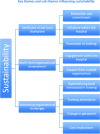Key components influencing the sustainability of a multi-professional obstetric emergencies training programme in a middle-income setting: a qualitative study
- PMID: 33902568
- PMCID: PMC8077832
- DOI: 10.1186/s12913-021-06385-5
Key components influencing the sustainability of a multi-professional obstetric emergencies training programme in a middle-income setting: a qualitative study
Abstract
Background: Multi-professional obstetric emergencies training is one promising strategy to improve maternity care. Sustaining training programmes following successful implementation remains a challenge. Understanding, and incorporating, key components within the implementation process can embed interventions within healthcare systems, thereby enhancing sustainability. This study aimed to identify key components influencing sustainability of PRactical Obstetric Multi-Professional Training (PROMPT) in the Philippines, a middle-income setting.
Methods: Three hospitals were purposively sampled to represent private, public and teaching hospital settings. Two focus groups, one comprising local trainers and one comprising training participants, were conducted in each hospital using a semi-structured topic guide. Focus groups were audio recorded. Data were analysed using thematic analysis. Three researchers independently coded transcripts to ensure interpretation consistency.
Results: Three themes influencing sustainability were identified; attributes of local champions, multi-level organisational involvement and addressing organisational challenges.
Conclusions: These themes, including potential barriers to sustainability, should be considered when designing and implementing training programmes in middle-income settings. When 'scaling-up', local clinicians should be actively involved in selecting influential implementation champions to identify challenges and strategies specific to their organisation. Network meetings could enable shared learning and sustain enthusiasm amongst local training teams. Policy makers should be engaged early, to support funding and align training with national priorities.
Keywords: Implementation; Middle-income setting; Obstetric emergencies, multi-professional training; Sustainability.
Conflict of interest statement
TD is a Trustee, and KG and ML are Members, of the PROMPT Maternity Foundation, the charity that produces the PROMPT training package. They do not receive any financial reward for their association with this charity. CW is a Member of, and employed by, the PROMPT Maternity Foundation. NB is employed by Project HOPE, the organisation that coordinated the local implementation of the Philippines PROMPT Project and provided funding for the study. RI was an employee of Project HOPE during the time of the study.
Figures




Similar articles
-
A rapid cycle method for local adaptation of an obstetric emergencies training program.Int J Gynaecol Obstet. 2018 Jun;141(3):393-398. doi: 10.1002/ijgo.12472. Epub 2018 Mar 15. Int J Gynaecol Obstet. 2018. PMID: 29468685
-
Evaluation of learning from Practical Obstetric Multi-Professional Training and its impact on patient outcomes in Australia using Kirkpatrick's framework: a mixed methods study.BMJ Open. 2018 Feb 17;8(2):e017451. doi: 10.1136/bmjopen-2017-017451. BMJ Open. 2018. PMID: 29455162 Free PMC article.
-
THISTLE: trial of hands-on Interprofessional simulation training for local emergencies: a research protocol for a stepped-wedge clustered randomised controlled trial.BMC Pregnancy Childbirth. 2017 Sep 7;17(1):294. doi: 10.1186/s12884-017-1455-9. BMC Pregnancy Childbirth. 2017. PMID: 28882116 Free PMC article. Clinical Trial.
-
The effects of interactive training of healthcare providers on the management of life-threatening emergencies in hospital.Cochrane Database Syst Rev. 2019 Sep 24;9(9):CD012177. doi: 10.1002/14651858.CD012177.pub2. Cochrane Database Syst Rev. 2019. PMID: 31549741 Free PMC article.
-
What is the impact of multi-professional emergency obstetric and neonatal care training?Best Pract Res Clin Obstet Gynaecol. 2015 Nov;29(8):1028-43. doi: 10.1016/j.bpobgyn.2015.03.017. Epub 2015 Apr 8. Best Pract Res Clin Obstet Gynaecol. 2015. PMID: 25937554 Review.
Cited by
-
Engaging women to set the research agenda for assisted vaginal birth.Health Expect. 2024 Jun;27(3):e14054. doi: 10.1111/hex.14054. Health Expect. 2024. PMID: 38877659 Free PMC article.
-
Influences of post-implementation factors on the sustainability, sustainment, and intra-organizational spread of complex interventions.BMC Health Serv Res. 2022 May 17;22(1):666. doi: 10.1186/s12913-022-08026-x. BMC Health Serv Res. 2022. PMID: 35581651 Free PMC article.
-
Content and design of respectful maternity care training packages for health workers in sub-Saharan Africa: Scoping review.Int J Gynaecol Obstet. 2025 Mar;168(3):857-874. doi: 10.1002/ijgo.15938. Epub 2024 Oct 30. Int J Gynaecol Obstet. 2025. PMID: 39475421 Free PMC article.
-
Interventions to reintroduce or increase assisted vaginal births: a systematic review of the literature.BMJ Open. 2023 Feb 14;13(2):e070640. doi: 10.1136/bmjopen-2022-070640. BMJ Open. 2023. PMID: 36787978 Free PMC article.
-
A research agenda to improve incidence and outcomes of assisted vaginal birth.Bull World Health Organ. 2023 Nov 1;101(11):723-729. doi: 10.2471/BLT.23.290140. Epub 2023 Oct 4. Bull World Health Organ. 2023. PMID: 37961052 Free PMC article.
References
MeSH terms
LinkOut - more resources
Full Text Sources

